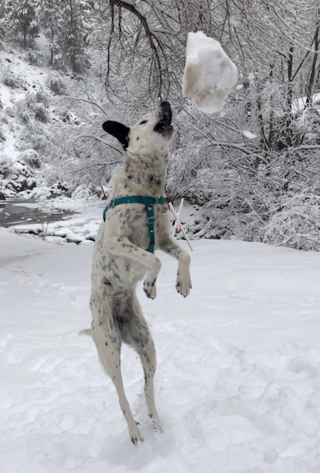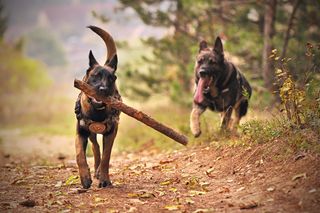Coronavirus Disease 2019
What Pet Owners and Vets Need to Know About COVID-19
A comprehensive publication from Colorado State University is essential reading.
Posted March 20, 2020 Reviewed by Lybi Ma
Please see "Don't Let Your Dog Put His Nose There, You Can't Trace It" (posted May 17) as a follow-up to this essay and also Katherine Compitus' Can I Catch Covid-19 From My Cat or Dog?
July 20: The World Health Organization has announced that dogs cannot transmit COVID-19 to humans so there is no need to quarantine them.
July 29: Exclusive: Buddy, first dog to test positive for COVID-19 in the U.S., has died
"Currently there is no evidence that pets or other domestic animals can be infected with this new coronavirus. Additionally, there is currently no evidence that pets or other domestic animals might be a source of infection to people with the new coronavirus. This is a rapidly evolving situation and information will be updated as it becomes available."
"The advisory also cautions veterinarians against using vaccines against canine enteric coronavirus available in some global markets in the hope that they may offer some cross-protection against COVID-19. There is no evidence for this, as the new virus is a distinctly different coronavirus variant." (My emphasis) —What pet owners and veterinarians need to know about the coronavirus
These guidelines are for the new COVID-19, not for other previous forms of the coronavirus. Everyone around the world really needs to know about what we know. A friend of mine in the Netherlands just told me that someone tried to poison her dog last week.
Updates: Leading Veterinary Diagnostic Company Sees No COVID-19 Cases in Pets and Emergency Exception Passed for Colorado’s Pet Animals in Need of Foster Care. Also see Puppy Mills, Pandemics, Disaster Preparedness, and Decency for what this exception means for fostering and rescuing dogs and cats.
Dutch dog, three cats infected with coronavirus (May 16, 2020)
The purpose of this brief piece is to alert readers to what I've learned is a relatively unknown publication from Colorado State University's College of Veterinary Medicine and Biomedical Sciences called "What pet owners and veterinarians need to know about the coronavirus" that answers basic questions about pets and the new coronavirus called COVID-19. It's available for free online and is essential reading for everyone who shares their homes with dogs and other companion animals, veterinarians, and everyone else who has contact with them.

The guidelines begin, "The World Small Animal Veterinary Association has issued updated guidance on its webpage, The New Coronavirus and Companion Animals – Advice for WSAVA Members. Links below have been updated as well. The World Small Animal Veterinary Association (WSAVA) says veterinarians and pet owners should not panic about contracting the coronavirus (COVID-19)... and it is highly unlikely that people could contract the new coronavirus (previously called 2019-nCoV) from their dog or cat, or that their companion animal could transmit the virus to people or other animals."
Here's some general advice. CSU professor of infectious disease Dr. Michael Lappin recommends that veterinarians tell owners to:
• Keep their companion animals with them if they are self-quarantined
• Keep cats inside
• Arrange care for any animals left at home if family or friends are hospitalized
• Contact their veterinarian immediately if they have questions or concerns
It's also important not to handle pets or other animals while sick.1,2
Other questions that are considered include: Should I avoid contact with pets or other animals if I am sick? What should I do if my pet or other animal becomes ill and was around a person with novel coronavirus? What are the concerns regarding pets that have been in contact with people infected with this virus? What should be done with animals in areas where the virus is active? and should veterinarians start to vaccinate dogs against canine coronavirus because of the risk of COVID-19?
This easy-to-read comprehensive summary that's updated as needed should be shared widely—locally, nationally, and globally—with people who live with dogs and other companion animals, veterinarians, and everyone else who has contact with other animals. This last group of people involves just about everyone I know. Everyone around the world really needs to know this information. A friend of mine in the Netherlands just told me that someone tried to poison her dog last week.
There's a good deal of misinformation being tossed around along with a basic misunderstanding of the relationship between the new COVID-19 and other animals. Along these lines, Dr. Stanley Coren writes, "Faced with this panic around the globe some dog owners are surrendering their dogs to shelters, while others quarantine their pets in the house, waiting for the time that the 'all clear' may be sounded. Meanwhile, a small new industry has appeared to supply tiny face-masks for dogs. All of this despite the assurances of the major medical, veterinary, and scientific agencies that there is no evidence that dogs can contract, transmit, or spread the COVID-19 virus." (See "Coronavirus: Police warn of Middlesbrough dog scam.")

While you're holed up and likely experiencing some radical changes in lifestyle because of the current pandemic, spend a lot of time with your companion animal(s), let them know how much you care for them, and let them enjoy themselves as much as possible. If they like to be hugged, hug them as much as possible on their terms, and if they like to play with you, get "down and dirty" with them and honor what they want and need. See Unleashing Your Dog for more information.
You can't give dogs and other companion animals too much love and it surely will be a win-win for all. We are very important for their psychological and spiritual health and they are very important for ours.
References
March 27: I just learned of an extremely rare case of a cat in Belgium contracting the virus. And in all 3 (there are only 2 other known) cases, “The animals had always contracted the virus from a human with the virus, not from another animal.” Also, "These findings indicate that dogs and cats are not infected easily with this virus, and there is no evidence that they play a role in the spread of the virus. Nevertheless, as COVID-19 is a newly emerged disease and the situation is still evolving, the AFCD is taking a precautionary approach in quarantining animals (mammals, including cats and dogs) from households with confirmed COVID-19 human cases." (My emphases)
The New Coronavirus and Companion Animals – Advice for WSAVA Members. (updated).
Bekoff, Marc. It's Time to Move on From Nonhuman Animal Models. (Animals don't "really tell you much about how the virus causes disease.")
_____. Puppy Mills, Pandemics, Disaster Preparedness, and Decency.
_____. "I'm a Mess About My Dogs and Coronavirus—How Will They Do?" (If a pandemic someday depletes humans, how will dogs fare without us?)
_____. Hugging a Dog Is Just Fine When Done With Great Care.
_____. Get Down and Dirty With Your Dog: Bow, Hug, and Tug.
_____. Being Touched Is Fine For Some Dogs, But Not for Others.
_____. Canine Confidential: Why Dogs Do What They Do. University of Chicago Press, Chicago, 2018.
_____ and Jessica Pierce. Unleashing Your Dog: A Field Guide to Giving Your Canine Companion the Best Life Possible. New World Library, Novato, California. 2019.
Christo, Cyril. Coronavirus should be a wake-up call to our treatment of the animal world.
Coren, Stanley. Unfounded Fears That Dogs Can Spread COVID-19 Can Cause Harm.
Pierce, Jessica. Is Your Cat Stressed Out About Covid-19? (How Covid-19 may be upending normal life for your cat and what to do about it.)
Todd,, Zazie. COVID-19 and Planning for Your Pet. (What pet owners need to know.)
Notes:
1) Dog expert Dr. Michael W. Fox recommends that people not pet others' dogs outside.
2) Renowned veterinarian Nicholas Dodman offers some advice about how to give your dog and yourself some much-needed exercise:
If you're under house arrest (so to speak), only allowed out to buy food or to go to the doctor’s office, you have a dilemma on your hands. Options are:
1. If you are lucky enough to have a yard of your own, that the place to go when needs arise for your dog.
2. If you are an apartment dweller, it may be possible to arrange a dog walker while you are quarantined, assuming strict anti-viral measures are in place at pick up and drop off. [Conceivably, the dog could act as a fomite (your germs could be deposited on any surface, including your dog’s coat) so proper hygiene would be needed.]
3. Late night or early morning short walks avoiding people (at least distancing) may be permitted in some regions. Lunchtime is trickier depending where you live.
4. I’m not sure how legal this is, I guess it depends which quarantine rules you’re under, but driving to wooded area with trails might be an option. I am not quarantined but regularly take my dog on these lonely trails where I meet almost no one.




